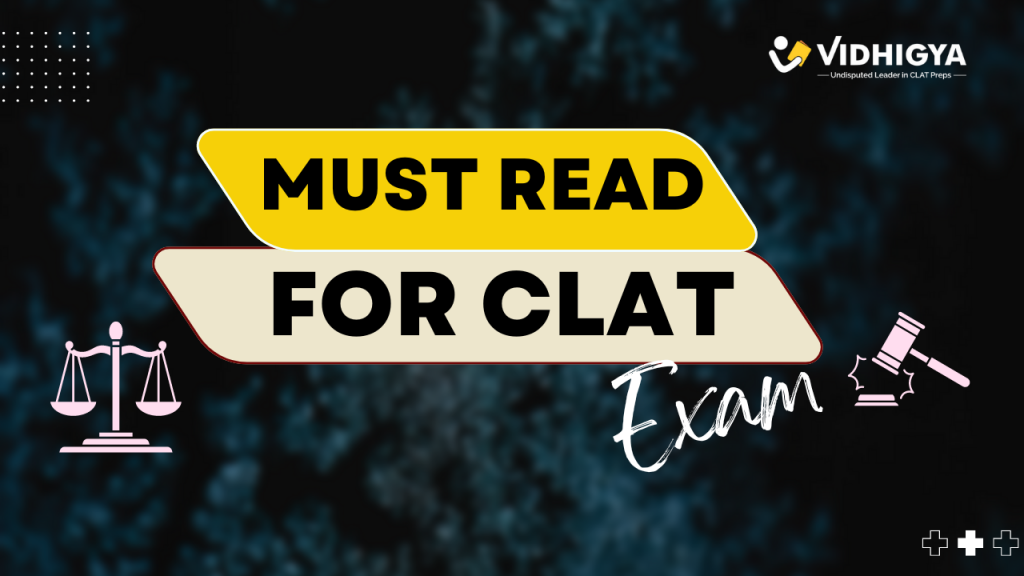Saara Lunawat hailing from Indore, Madhya Pradesh has achieved this feat and made it large. She has secured admission to NLU Delhi.
Know the success secrets, habits and the prep strategy he adopted that fetched her this success in AILET 2025.
Vidhigya Correspondent: Hi Saara, Many Congratulations on achieving this feat. Tell us something about yourself.
Saara: Hi, I’m Saara, a grade XII student from Daly College Indore. I studied in the Cambridge IGCSE and A Level Examinations Board, I had a mix of subjects from commerce with psychology. I successfully cleared CLAT and AILET. I performed better in the latter, securing AIR 4 in AILET 2025. I joined Vidhigya in Grade XI, and I have been an exclusive student at Vidhigya for the two year classroom program so I could prepare for the law entrance exams along with balancing my commitments at school.
Vidhigya Correspondent: There are different fields after 12th, what motivated you to make a career in law?
Saara: I hadn’t been dead set on law as an educational/career path until the end of grade X. I have always been interested in geopolitics and public policy and for a long time considered getting an undergraduate degree in the same. However, over time, by talking to both professionals and my friends & family, I realised that studying law is a more flexible and practical option. A legal education is also extremely good for ultimately contributing to legislations and international agreements, something I hope to do in the future. Ultimately, to create real change in society, you have to first understand what governs it i.e the law.
Vidhigya Correspondent: During your CLAT & AILET preparation, did you ever think that you would made it to NLU Delhi
Saara: To be extremely frank, I wasn’t very confident about clearing AILET. And the nature of AILET as an exam has a lot to do with that, considering how few seats AILET has compared to CLAT… While I always liked the pattern of AILET more as an examination because it is as much about speed of comprehension as it is about accuracy, you can never know what will finally come on the day of the exam! Nonetheless, I always liked the sections of AILET more so felt more confident in my abilities for the same. At the end of the day, it really does come down to the day of the examination, no matter how well you perform before it, keeping your cool on the day of the exam is the final obstacle for all aspirants.
Vidhigya Correspondent: Tell us about your CLAT & AILET preparation?
Saara: I started preparing for CLAT and AILET after my tenth boards and the commencement of Grade XI. I wasn’t the best student in the first year because there is a learning curve to balancing both school and the preparation for such exams. I had made a promise to myself to not lose myself in the process, so I continued to be active in my school as much as I could be along with preparations. This isn’t something I would recommend and it really comes down to personal preference. Despite being in school or out of town for different school activities, I would carry my preparation material and make time to study during the commute and in my free time. This is an extremely gruelling process at times so it is essential to take breaks and prevent burnout. The year of my entrance exams as I entered Grade XII, I had begun to let a lot go, including my extracurriculars and sports. This was very difficult at first but it is a necessary sacrifice in my opinion. I would try to make the most of vacations and holidays as these are really the times you can study uninterrupted. I would set targets weekly and decide beforehand what topics I want to tackle. Reading the newspaper became a habit and I would attend classes as regularly as I could, and take material I missed to ensure I was always on track.
Vidhigya Correspondent: How did you prepare for the FIVE sections of the paper? Can you elaborate on your preparation strategy for each section?
Saara: For CLAT and AILET I think its better to explain this section by section.
RC: Reading books and the newspaper is key. The only way to get better with this section is to become familiar with English as a language. It is crucial to read and assimilate yourself in English as much as you can, including media and literature. I have always enjoyed reading and been a debater in school so I used to capitalise on reading heavy sections. It is also very well possible to develop this ability over time as it only gets better with practice. Modules are your best friend in this case.
CR: I initially struggled a lot with CR, but for me the best help was the faculty. Solving modules by yourself is good but going to the faculty when you have a doubt is better. In fact, I would ask the teachers to go line by line and then to the question to see how experts would view the same questions. This really helped me understand the techniques we have to apply in the exam ourselves as students. This can seem like a long task at first but it really builds up your abilities over time.
GK: This is a very make or break section for many. It was the same for me, in fact even until the very last months I would not perform well in this section. The biggest thing you can do for this subject is build a foundation. Static GK is difficult to do in one go but doing it bit by bit and building a repository of facts is essential. Newspaper reading is unavoidable and no doubt builds the backbone of your preparation not just for GK but the other reading intensive sections of this paper too. I would suggest picking up a topic from the paper and thinking of all the possible questions an examiner could ask, looking up the answers and associating facts in this manner. This really helped me bridge static and current GK into a more complementary subject.
Legal: Legal is a very tactical subject. It is about identifying the key parts of the passage and applying them in the questions that follow. The more you practice these kinds of questions, the better. Because it is not as direct as RC or CR for that matter. A tip I would suggest is to always keep in mind exceptions or the small rules, because these are generally the facts a question modifies to test the attentiveness and the attention to detail a student possesses.
QT: QT is the one subject I would say which is only and only about practice. Familiarising yourself with mental math and quick tricks to solve questions is what will give you the competitive edge and the extra few minutes in such a time sensitive exam. I would religiously solve sheets and even ask for more when I was done, I would recommend to never hesitate from asking the faculty for more material and sitting with them with queries.
For sections like GK and QT, it is crucial to really find things that can make studying them enjoyable. It can seem very boring at times but what helped me was to find interesting ways to study these subjects on my own. This is different for everyone so try different methods and see what works for you!
With AILET, RC and GK were already in progress with CLAT. And AR was going hand in hand with QT, attending tuitions and solving the sheets + modules was the main thing for me.
Vidhigya Correspondent: What was your study routine and best practices for CLAT?
Saara: In my opinion, the first thing you should do is build a schedule you can work with and then stick to it as much as possible. This seems difficult at first but becomes more and more habitual over time. During school days I would try to wake up earlier so I could get the day’s GK out of the way. After school I would have some time before class to finish any sheets or modules I had pending for the day. After class I would take a small break before revising the class material and finishing any sheets given I the class. I would also recommend revising the GK from the morning once again at night before sleeping, this really helps consolidate the facts in your mind. And once I took a break from school I had a modified version of this plan which would maximise the time I could give to my preparation.
The key to entrance exams in my opinion is discipline. Bahul sir’s words summarise this perfectly:
“Hard work beats talent when talent doesn’t work hard.”
Vidhigya Correspondent: Did you take mock tests; how many did you take? Are they useful?
Saara: Mock tests were the most important part of my preparation. I tried to take as many mocks as possible and I am sure by the time I was ready to appear for the exams I had given over 80 mocks. While modules, classes and sheets are good for going in depth of a section, nothing can beat the preparation you get from simulating the real test environment and solving all 5 sections (or 3 in the case of AILET) in the same time bound conditions. It really prepares you for the endurance you need on D-Day. I also found out what techniques work for me and how I should time my sections over time, these are the kind of practical insights you only get from mocks which can decide how you finally perform on the D-Day.
Vidhigya Correspondent: There are certain times when you don’t score good in your Mock Tests and you feel low about it. Did it happen to you? If yes, how did you cope with such feelings?
Saara: Definitely there have been times my mock scores have suddenly dropped. One week you may be in the top 10 and in the next week your scores drop dramatically. Nonetheless I would always remind myself that such exams are a test of ‘relative’ performance and not ‘absolute’ performance. If in one mock you score 80 and in the next you score 65, it is also possible that the mock was difficult in general. I had to learn to not get demotivated by these fluctuating numbers and instead focus on the improvements I could make to avoid any and all mistakes in the future. I would also always keep my tutors updated on my performances and discuss how I could be better in the future, this helped me stay accountable and focused on the next test.
Vidhigya Correspondent: Please elaborate your experience of D- Day & Learnings from the same
Saara: My D-Day experience was not the best! I arrived at the centre and just seeing the crowds and competition was very overwhelming. There is of course a lot of thoughts racing in your mind too and I just tried to keep my mind cool and calm as I reached the exam hall. What helped me was to find the few familiar faces in the crowd and stick with them in the last few moments before we entered the exam hall. Appearing for these exams really teaches you a lot, not just academically, but as life lessons. After CLAT, I had a feeling I had not done my best and that was a really disheartening experience, but pushing through it to prepare in the last few days before AILET requires a strength I didn’t know I developed. Even after the CLAT exam is over, there is a lot of anxiety in the air about the results, so preparation for AILET becomes even harder. I remember the day of the AILET exam was when CLAT results came out in the morning. Despite being disappointed with my result, I pushed forward and appeared for the AILET exam. I learned to process the result immediately and really keep my mind focused this time around. When I came out of the centre I knew I had done my best and that was all I needed to know.
Vidhigya Correspondent: Your message for the other CLAT & AILET Aspirants preparing for upcoming CLAT exams?
Saara: I think there is a lot to take away from my D-Day experiences. Despite feeling well prepared throughout the year, it really comes down the mentality in the last few months. Please do not think of these exams as the end all be all for your lives, they are extremely important but do not pressurise yourself, it will only affect your psyche on the day of the paper. Be true to yourself and the preparation you put in for the exams. And always have faith in yourself and in the universe that you will end up right where you need to be.
Talk to your mentors and faculty as much as possible! They will guide you in the best way possible. I owe a lot to my teachers and Bahul sir and Samip sir, who always kept me on track and helped me do my best at the end.
Whenever you feel tired or demotivated, remind yourself of why you chose this path and the future you want to build for yourself and the world. That is the purest motivation you can get, and no one can provide that for you except yourself.
Vidhigya Correspondent: Wish you success in all your academic and professional pursuits. Stay Blessed and Stay LAWgical !!!



